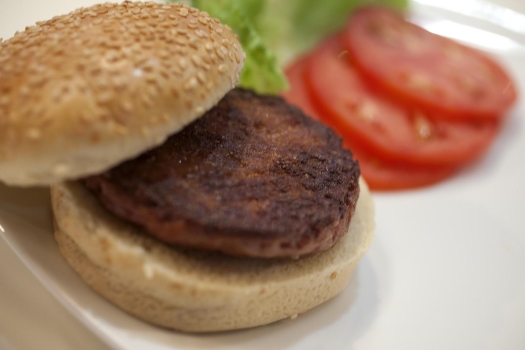
Is the Lab-Created Burger Kosher?
Scientists have recently demonstrated that they can now take stem cells from a cow and build them into hamburgers that look, feel and (almost) taste like the real thing. What does Jewish law have to say? Is this considered real meat? Is it kosher?
This is a fascinating question that needs to be studied carefully by expert rabbis when the issue becomes more practical and Petri-dish burgers become an affordable option. But here are some preliminary thoughts on the subject to give you some perspective.
Meat from Heaven
What makes this question so intriguing is that this is an example of how those seemingly fantastic Aggadic tales in the Talmud are nowadays becoming a starting point for new halachik questions.
There is actually a discussion in the Talmud about whether meat that does not come from an animal is considered kosher, although the origin of the meat in this case was even more miraculous:
A story of Rabbi Shimeon ben Chalafta, who was walking on the road, when lions met him and roared at him. Thereupon he quoted from Psalms: “The young lions roar for prey and to beg their food from G‑d,” and two lumps of flesh descended [from heaven]. They ate one and left the other. This he brought to the study hall and propounded: Is this fit [for food] or not? The scholar answered: “Nothing unfit descends from heaven.” Rabbi Zera asked Rabbi Abbahu: “What if something in the shape of a donkey were to descend?” He replied: “You ‘howling yorod,’ did they not answer him that no unfit thing descends from heaven?”
Miraculous meat appears again in the Talmud, although this time it was man-made:
Rabbi Chanina and Rabbi Oshaia would spend every Sabbath eve studying the “Book of Creation” by means of which they created a calf and ate it.
In discussing this story, later commentators debate whether such an animal would require shechitah (kosher slaughter) in order to be eaten.
Rabbi Yeshayah Halevi Horowitz, known as the Shelah, writes that it is not considered a real animal and does not need shechitah.
Others write that while a technical interpretation of Biblical law may not require such an animal to be slaughtered, the rabbinical prohibition of “marit ayin” (not engaging in acts that look misleadingly similar to forbidden activity) would necessitate slaughter–lest an onlooker think that ordinary meat is being consumed without shechitah.
Test-Tube Beef
So far we have discussed “miracle meat” that came from heaven or was created by spiritual means. Some commentators defined this meat as miraculous because it did not come from a naturally-born animal. But do we consider any meat that does not come from a naturally-born animal to be “miracle meat”? Or does it need to come through an actual miracle? How about test-tube meat, which does come from actual animal cells? In this case the dictum that “no unfit thing descends from heaven” obviously would not apply. Here are some of the issues that will need to be explored:
● The Cells The scientist extracted the cells of a real animal and used them to grow the tissues in a Petri dish. If, and that is not a small if, the mere cells are considered substantial enough to be called meat, this may present a problem. In addition to the prohibition of eating a limb from a living animal, there is an additional injunction not to eat any meat that was severed from a live animal.
This is an issue for non-Jews as well as Jews, since Noahide law dictates that non-Jews may not eat even a minute amount of meat that was separated from a living animal.
For Jews, if the cells are considered real meat, then presumably they would need to be extracted from a kosher animal that was slaughtered according to Jewish law.
Another consideration is that there is a halachik concept, “the product of non-kosher is itself not kosher, and the product of that which is kosher is itself kosher.” While at first glance this would seem to imply that the cells need to come from a kosher source, it is not clear whether the above rule would apply to microscopic cells that were extracted from an animal.
● The Product In Jewish law, a food that contains only a minuscule amount of a non-kosher ingredient can still be considered kosher if the non-kosher ingredient is nullified (usually) by at least a factor of 60 to 1. At first glance it would appear that we can apply this rule to our scenario, since the original cells are greatly outnumbers by the “meat” produced. However, halachah states that the above rule does not apply to a “davar hama’amid,” an ingredient that establishes the form of the item. The essential ingredient can never be nullified, no matter how small it is. It would seem that the same rule applies to the cells that are essential to growing the meat. If they don’t come from a kosher source, they can never be nullified, and whatever is created with them is also not kosher.
As noted earlier, these are just preliminary thoughts on the subject. Any halachik ruling would have to come from rabbis who are expert in these matters.













Milhouse
First, it should be noted that the “meat” announced this week doesn’t look, feel, or taste anything like real meat. But the question is still whether it’s kosher. And realistic vat-grown meat will eventually come, it’s only a matter of time. So by all means let’s discuss it.
Vat-grown meat does not come from an animal at all. You are not eating the cells that came from the animal, you’re eating cells that were grown from those, but have never even been near an animal. Assuming that the medium in which they were cultured is kosher, so is the meat. The best way to look at this meat is as a sort of fungus, like mushrooms or quorn.
If you’re worried about the substance of the starter cells that are still in there, first of all they’re microscopic and therefore halachically have no metzius, but if that isn’t enough for you, then consider that by the time this comes to market it will not be the original meat cultured from animal cells, but rather several generations removed. There are two examples that show this makes it OK:
1. Gidulei terumah are forbidden, but gidulei gidulin are permitted. i.e. the second generation has no substance from the original forbidden seed.
2. Yoghurt which is cultured in kosher milk but with a treife starter is forbidden; but if it’s been though three generations, the fourth generation is kosher, and even lechatchila one may inoculate milk with a third-generation starter.
Andrea Schonberger
I saw a photo of that lab-created hamburger on the television news. No matter if it’s 1000 times kosher I won’t eat it as it looks like a blood soaked sponge–GROSS!
sure!
yes……um no? I would not eat it regardless. Should it ever become the “norm” I will become vegan! Its just too weird, too tampered with. It will no doubt have long term effects like mad-cow and who knows what else. I think smart people will avoid it like the plague.
Milhouse
That is not smart, it’s stupid. There is no reason at all to suspect anything wrong with it. It will eventually become the norm, and eating it will be vegan, because it’s not an animal.
By the way, is there any species we eat that has not been “tampered with”, as you put it? What do you think we’re in this world for if not to “tamper with it”, i.e. to improve it?
It doesn't have to be ever min hachai
Since the stem cells can be removed from the animal immediately after the animal died
Lubavitch Shchita??
It might be kosher but is it really Lubavitch shchita if it comes from non-Lubavitch stem cells????